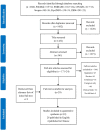Unmet care needs of community-dwelling stroke survivors: a systematic review of quantitative studies
- PMID: 33879490
- PMCID: PMC8061855
- DOI: 10.1136/bmjopen-2020-045560
Unmet care needs of community-dwelling stroke survivors: a systematic review of quantitative studies
Abstract
Objectives: Understanding the unmet needs of community-dwelling stroke survivors is essential for further intervention. This systematic review was performed to summarise their unmet needs from a quantitative viewpoint.
Design: Systematic review using the Preferred Reporting Items for Systematic Reviews and Meta-Analyses guidelines.
Data sources: A comprehensive search of six databases was conducted from inception to February 2020: PubMed, EMBASE, CINAHL, PsycINFO, SCOPUS and CBM. The methodological quality of the studies was assessed. Unmet needs were categorised, and a pooled analysis of the main outcomes was conducted.
Eligibility criteria for selecting studies: We included quantitative studies focused on the unmet needs of stroke survivors who live at homes rather than in any other institutionalised organisation.
Results: In total, 32 of 2660 studies were included, and 1980 unmet needs were identified. The prevalence of patients with unmet needs ranged from 15.08% to 97.59%, with a median of 67.20%; the median number of unmet needs per patient ranged from 2 to 8 (0-31). The prevalence of unmet needs was high at 6 months post-stroke (62.14%) and 2 years post-stroke (81.37%). After categorisation, the main concerns among these patients were revealed to be information support, physical function and mental health; a few studies reported unmet needs related to leisure exercise, return to work and so on. Additionally, differences in the measurement tools used across studies affect what unmet needs participants report.
Conclusions: Sufficient, accurate, individualised and dynamic information support is a priority among community-dwelling stroke survivors. Physical function and mental health are also the most significant concerns for re-achieving social participation. It is essential to design and disseminate standard, effective and time-saving tools to assess unmet needs.
Trial registration number: CRD42018112181.
Keywords: public health; quality in healthcare; rehabilitation medicine; stroke.
© Author(s) (or their employer(s)) 2021. Re-use permitted under CC BY-NC. No commercial re-use. See rights and permissions. Published by BMJ.
Conflict of interest statement
Competing interests: None declared.
Figures
References
-
- Forster A. Validation of the longer-term unmet needs after stroke (LUNS) monitoring tool: a multicentre study. Clinical rehabilitation 2013;27:1020–8. - PubMed
Publication types
MeSH terms
LinkOut - more resources
Full Text Sources
Other Literature Sources
Medical



